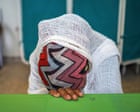
In a world constantly in motion, recent events spotlight the resilience and challenges faced by communities across the globe. This article takes a calm and compassionate look at these pressing issues, acknowledging the courage of those involved while recognizing the need for mindful reflection and action.
The Tigray region in Ethiopia stands as a testament to both suffering and the strength of humanitarian response efforts. A recent comprehensive report by Physicians for Human Rights and the Organization for Justice and Accountability in the Horn of Africa has revealed widespread and systematic atrocities, including mass rape and sexual torture, carried out predominantly by Ethiopian and Eritrean forces. These actions, deemed crimes against humanity, have left deep scars on countless women and children in the region. This documentation serves as a clarion call for the world to address the plight of the Tigray people and seek justice for the victims.
In a different part of the world, open acknowledgment of accountability emerged from China. Following the severe flooding that engulfed Beijing, a tragic event that resulted in the loss of at least 40 lives, city officials openly admitted to gaps in preparedness for extreme weather. Local leaders, including Yu Weiguo from the heavily affected northern district of Miyun, have recognized these shortcomings, laying the groundwork for improved response systems in the face of escalating climate challenges. This rare admission underscores a critical step towards resilience and adaptation in urban areas increasingly vulnerable to natural disasters.
Focus shifts to the United States where individual challenges reflect broader systemic issues. At Georgia’s Stewart detention center, Rodney Taylor, a detainee with prosthetic legs, was placed in solitary confinement after refusing to enter his flooded cell, citing concerns for his health and safety. Such instances highlight the ongoing need for empathy and better management practices in detention facilities, ensuring that all individuals are treated with dignity and care, regardless of circumstances.
In Montana, a poignant reminder of the urgency of addressing gun violence emerged as a shooting at a local bar claimed four lives, marking the ninth mass murder in the United States in the year 2025. As law enforcement continues to search for the suspect, communities grieve and reflect on the personal and collective impact of such incidents. This incident reinforces the need for comprehensive policies and community engagement to prevent future tragedies and promote safer environments for all.
Elsewhere, in discussions on the separation of state and religion, debates intensify concerning the role of government in respecting and understanding diverse belief systems. As dialogues continue, the importance of mutual respect and humility becomes ever more apparent, signaling a path forward built on shared values and harmonious coexistence.
Taken together, these stories from various corners of the world speak to the immediate, yet timeless, human need for compassion, understanding, and action. They urge readers to remain aware, engaged, and proactive in fostering a more just and resilient global society. By embracing these virtues, societies can collectively strive toward healing and progress, embodying the best of humanity’s potential.
Source: {link}
